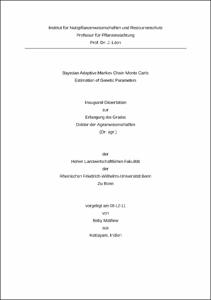Mathew, Boby: Bayesian Adaptive Markov Chain Monte Carlo Estimation of Genetic Parameters. - Bonn, 2012. - Dissertation, Rheinische Friedrich-Wilhelms-Universität Bonn.
Online-Ausgabe in bonndoc: https://nbn-resolving.org/urn:nbn:de:hbz:5n-28102
Online-Ausgabe in bonndoc: https://nbn-resolving.org/urn:nbn:de:hbz:5n-28102
@phdthesis{handle:20.500.11811/5102,
urn: https://nbn-resolving.org/urn:nbn:de:hbz:5n-28102,
author = {{Boby Mathew}},
title = {Bayesian Adaptive Markov Chain Monte Carlo Estimation of Genetic Parameters},
school = {Rheinische Friedrich-Wilhelms-Universität Bonn},
year = 2012,
month = apr,
note = {Accurate estimation of genetic parameters is crucial for an efficient genetic evaluation system. REML and Bayesian methods are commonly used for the estimation of genetic parameters. In Bayesian approach, the idea is to combine what is known about the parameter which is represented in terms of a prior probability distribution together with the information coming from the data, to obtain a posterior distribution of the parameter of interest. Here a new fast adaptive Markov Chain Monte Carlo (MCMC) sampling algorithm is proposed. It combines both hybrid Gibbs sampler and Metropolis-Hastings (M-H) algorithm, for the estimation of genetic parameters in the linear mixed models with several random effects. The new adaptive MCMC algorithm has two steps: in step 1 the hybrid Gibbs sampler is used to learn an efficient proposal covariance structure for the variance components, and in step 2 the M-H algorithm is used to propose new values based on the learned covariance structure from step 1. Normally the dependencies among the random effects slow down the convergence of the MCMC chain. So in the second step of the algorithm those random effects were marginalized from the likelihood to improve the mixing of the chain. The new algorithm showed good mixing properties and was about twice time faster than the hybrid Gibbs sampling to produce posterior for variance components. Also the new algorithm was able to detect different modes in the posterior distribution. Moreover, the new proposed exponential prior for variance components was able to provide estimated mode of the posterior dominance variance to be zero in case of no dominance. The performance of the method was illustrated with field data and simulated data sets.},
url = {https://hdl.handle.net/20.500.11811/5102}
}
urn: https://nbn-resolving.org/urn:nbn:de:hbz:5n-28102,
author = {{Boby Mathew}},
title = {Bayesian Adaptive Markov Chain Monte Carlo Estimation of Genetic Parameters},
school = {Rheinische Friedrich-Wilhelms-Universität Bonn},
year = 2012,
month = apr,
note = {Accurate estimation of genetic parameters is crucial for an efficient genetic evaluation system. REML and Bayesian methods are commonly used for the estimation of genetic parameters. In Bayesian approach, the idea is to combine what is known about the parameter which is represented in terms of a prior probability distribution together with the information coming from the data, to obtain a posterior distribution of the parameter of interest. Here a new fast adaptive Markov Chain Monte Carlo (MCMC) sampling algorithm is proposed. It combines both hybrid Gibbs sampler and Metropolis-Hastings (M-H) algorithm, for the estimation of genetic parameters in the linear mixed models with several random effects. The new adaptive MCMC algorithm has two steps: in step 1 the hybrid Gibbs sampler is used to learn an efficient proposal covariance structure for the variance components, and in step 2 the M-H algorithm is used to propose new values based on the learned covariance structure from step 1. Normally the dependencies among the random effects slow down the convergence of the MCMC chain. So in the second step of the algorithm those random effects were marginalized from the likelihood to improve the mixing of the chain. The new algorithm showed good mixing properties and was about twice time faster than the hybrid Gibbs sampling to produce posterior for variance components. Also the new algorithm was able to detect different modes in the posterior distribution. Moreover, the new proposed exponential prior for variance components was able to provide estimated mode of the posterior dominance variance to be zero in case of no dominance. The performance of the method was illustrated with field data and simulated data sets.},
url = {https://hdl.handle.net/20.500.11811/5102}
}






